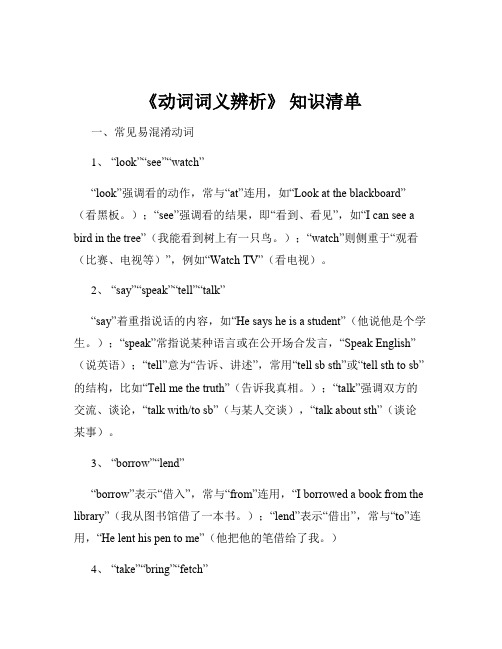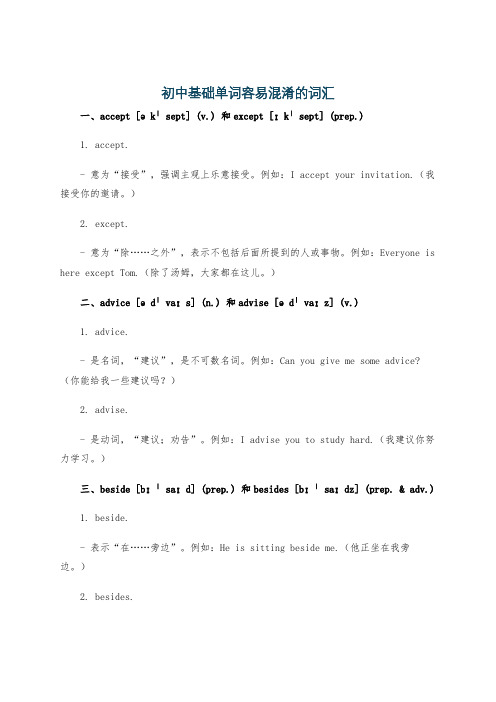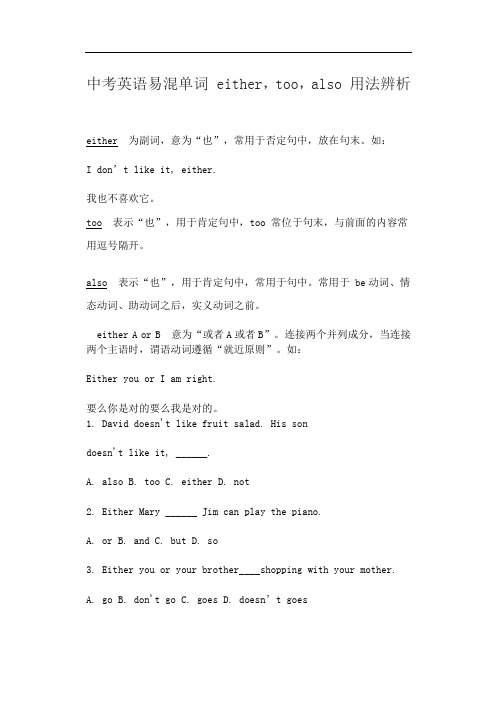初中英语易混动词辨析
《动词词义辨析》 知识清单

《动词词义辨析》知识清单一、常见易混淆动词1、“look”“see”“watch”“look”强调看的动作,常与“at”连用,如“Look at the blackboard”(看黑板。
);“see”强调看的结果,即“看到、看见”,如“I can see a bird in the tree”(我能看到树上有一只鸟。
);“watch”则侧重于“观看(比赛、电视等)”,例如“Watch TV”(看电视)。
2、“say”“speak”“tell”“talk”“say”着重指说话的内容,如“He says he is a student”(他说他是个学生。
);“speak”常指说某种语言或在公开场合发言,“Speak English”(说英语);“tell”意为“告诉、讲述”,常用“tell sb sth”或“tell sth to sb”的结构,比如“Tell me the truth”(告诉我真相。
);“talk”强调双方的交流、谈论,“talk with/to sb”(与某人交谈),“talk about sth”(谈论某事)。
3、“borrow”“lend”“borrow”表示“借入”,常与“from”连用,“I borrowed a book from the library”(我从图书馆借了一本书。
);“lend”表示“借出”,常与“to”连用,“He lent his pen to me”(他把他的笔借给了我。
)4、“take”“bring”“fetch”“take”意为“带走、拿走”,指从说话者所在的地方带到别处去,“Take this book to your classroom”(把这本书带到你的教室去。
);“bring”表示“带来、拿来”,指从别处带到说话者所在的地方,“Bring your homework here tomorrow”(明天把你的作业带来。
);“fetch”则表示“去取来、去拿来”,强调往返的动作,“Fetch some water for me, please”(请给我去取些水来。
初中基础单词容易混淆的词汇

初中基础单词容易混淆的词汇一、accept [əkˈsept] (v.) 和except [ɪkˈsept] (prep.)1. accept.- 意为“接受”,强调主观上乐意接受。
例如:I accept your invitation.(我接受你的邀请。
)2. except.- 意为“除……之外”,表示不包括后面所提到的人或事物。
例如:Everyone is here except Tom.(除了汤姆,大家都在这儿。
)二、advice [ədˈvaɪs] (n.) 和advise [ədˈvaɪz] (v.)1. advice.- 是名词,“建议”,是不可数名词。
例如:Can you give me some advice?(你能给我一些建议吗?)2. advise.- 是动词,“建议;劝告”。
例如:I advise you to study hard.(我建议你努力学习。
)三、beside [bɪˈsaɪd] (prep.) 和besides [bɪˈsaɪdz] (prep. & adv.)1. beside.- 表示“在……旁边”。
例如:He is sitting beside me.(他正坐在我旁边。
)2. besides.- 作介词时,意为“除……之外(还有)”;作副词时,意为“而且;此外”。
例如:Besides English, we also learn French.(除了英语,我们还学法语。
);I don't like this dress. Besides, it's too expensive.(我不喜欢这条裙子。
而且,它太贵了。
)四、borrow [ˈbɒrəʊ] (v.) 和lend [lend] (v.)1. borrow.- 意为“借入”,常用搭配borrow sth. from sb.。
例如:I borrow a book from the library.(我从图书馆借了一本书。
中考英语易混单词 either,too,also 用法辨析

中考英语易混单词 either,too,also 用法辨析
either 为副词,意为“也”,常用于否定句中,放在句末。
如:
I don’t like it, either.
我也不喜欢它。
too 表示“也”,用于肯定句中,too 常位于句末,与前面的内容常用逗号隔开。
also 表示“也”,用于肯定句中,常用于句中。
常用于 be动词、情态动词、助动词之后,实义动词之前。
⭐️either A or B 意为“或者A或者B”。
连接两个并列成分,当连接两个主语时,谓语动词遵循“就近原则”。
如:
Either you or I am right.
要么你是对的要么我是对的。
1. David doesn't like fruit salad. His son
doesn't like it, ______.
A. also
B. too
C. either
D. not
2. Either Mary ______ Jim can play the piano.
A. or
B. and
C. but
D. so
3. Either you or your brother____shopping with your mother.
A. go
B. don't go
C. goes
D. doesn’t goes。
中考英语词汇部分专题讲解:中考英语易混词汇辨析

中考英语易混词汇辨析及练习above/over/on词汇用法例句above “在……上方”,不一定含有垂直在上的意思。
反义词为:belowThe sun rose above the horizon.太阳升到了地平线以上。
over“在……上面”,含有垂直在上的意思There is a bridge over the river.河上有座桥。
on“在……上面”,含有与表面相接触的意思There is an oil painting on the wall.墙上有一幅油画。
across/through词汇用法例句across “横过,穿过”,指从……的一边到另一边Be careful when you walk across the road.当你过马路的时候要小心。
through“穿过”,强调从内部穿过The river flows through the city from west to east.这条河从西到东流过城市。
at all/after all词汇用法例句at all “全然,根本不”,一般用于否定句中加强语气She doesn’t like football at all.她一点也不喜欢足球。
after all “毕竟,终究,到底”,一般置于句首或句末作状语After all,he is a child.毕竟,他还是个孩子。
few/a few/little/a little词汇含义修饰名词肯定/否定例句few 几乎没有可数否定I am a new comer here,so I have few friends here.我刚来到这里,所以我在这里没有几个朋友。
a few有一些肯定Though the man has been here for only one month, he has a few friends.尽管这个人才在这里住了一个月,但他就有了一些朋友。
little 几乎没有不可数否定There is little water in the glass,so you can’t drinkany.杯子里几乎没有水了,你不可能喝到水了。
中考英语易混单词 answer、reply 辨析

中考英语易混单词 answer、reply 辨析
answer “回答、答复”。
是最普通的用语,包括用口头、书面或行动回答。
它可以用作及物动词或不及物动词。
如:
He answered my question.
他回答了我的问题。
Please answer my letter as soon as possible.
请尽快给我回信。
They left a boy to answer the bell.
他们留下一个男孩应门。
reply “回答、答复”。
但比 answer 正式些。
它指用口头或书面回答。
严格地讲,是指有针对性地详细地回答。
它也指用行动回答。
reply 常用作不及物动词,回答某人或某事。
后接 to; 当它与直接引语或从句连用时,才用作及物动词。
如:
I didn’t reply to him.
我没有答复他。
He replied that he was busy.
他回答说他很忙。
He replied that he disagreed.
他回答说他不同意。
《动词词义辨析》 知识清单

《动词词义辨析》知识清单一、常见的容易混淆的动词组1、“look”“see”“watch”“look”强调看的动作,常与“at”连用,例如:“Look at the blackboard”(看黑板。
)“see”强调看的结果,即“看到、看见”,例如:“I can see a bird in the tree”(我能看到树上有一只鸟。
)“watch”侧重于观看、注视,通常用于观看比赛、电视、表演等,比如:“Watch the football match”(观看足球比赛。
)2、“borrow”“lend”“borrow”表示借入,常用搭配为“borrow sth from sb”,例如:“I borrowed a book from the library”(我从图书馆借了一本书。
)“lend”则表示借出,常用“lend sth to sb”,如:“She lent her pen to me”(她把她的笔借给了我。
)3、“spend”“cost”“take”“pay”“spend”的主语是人,花费的可以是时间或金钱,常用结构为“spendon sth”或“spend(in) doing sth”,例如:“He spends two hours on his homework every day”(他每天花两个小时做作业。
)“cost”的主语是物,表示某物花费了某人多少钱,例如:“The book costs me 20 yuan”(这本书花了我 20 元。
)“take”通常用于“it takes sb some time to do sth”的句型中,表示做某事花费某人多少时间,比如:“It takes me half an hour to go to school by bike”(骑自行车去上学花了我半小时。
)“pay”的主语是人,常用搭配为“pay for”,表示为某物付款,例如:“I paid 50 dollars for the coat”(我为这件外套付了 50 美元。
中考英语易混词汇辨析
in the way
“挡路;妨碍”
Your car isin the way.你的小汽车挡路了。
because/because of
词汇
含义
用法
例句
because
因为
是连词,其后接句子
He didn’t comebecausehe was ill.
因为病了,他没来。
because of
她一点也不喜爱足球。
after all
“怎么说,终究,到底”,一般置于句首或句末作状语
After all, he is a child.怎么说,他依旧个孩子。
few / a few / little / a little
词汇
含义
修饰名词
确信/否定
例句
few
几乎没有
可数
否定
I am a new comer here, so I havefewfriends here.
before
后接“时间点”,可用于任何时态;它也可放在“时间段”后,用于完成时或一般过去时
I got therebefore5 o’clock in the afternoon.
我下午五点钟前到了那儿。
I never saw himbefore.
我往常没见过他。
alone/ lonely
词汇
用法
一言辨义
是复合介词,其后接名词、代词、动名词、what从句等
We have to put off the meetingbecause ofthe bad weather.
因为天气不好,我们不得不推迟会议。
be afraid that/be afraid of
【中考英语、英语语法】【人教版】中考英语动词及动词短语考点剖析
中考英语:动词及动词短语考点一常见易混动词辨析1.spend/pay/cost/take表示“花费”spend主语是人,指花费时间和金钱。
spend... on...; spend... (in) doing sth.pay主语是人,指花费金钱。
pay... for...=spend... oncost主语是物或某种活动,指花费金钱或其他代价。
sth. cost(s) (sb.)...多用it作形式主语,指花费时间。
It takes sb. ... to do sth.=Sb. spend(s)... (in) doin takesth.Mom never spends any money on herself.妈妈从来都不在自己身上花钱。
May I borrow 12 yuan from you? I’ll pay it back next week.你能借给我12块钱吗?我下周还你。
It won’t cost you a penny for the first six months.开始的六个月你不用花一分钱。
It took them three years to build this road.他们用三年时间修完了这条路。
2.look/watch/see/read 表示“看”look看(动作);可单独成句;look at...watch看(电视、比赛);注视see看见(结果);看望;理解(I see.)read看(书、报);读;读懂别人的内心★look可以表示“看上去”,是感官系动词,后接形容词。
★看病(看医生)用see a doctor表示。
3.speak/say/talk/tell表示“说”speak发言;说(某种语言)say说(内容);写有talk谈论;talk about sth.; talk to/with sb.tell告诉;讲述;tell sb. (not) to do sth.4.感官动词look/taste/sound/feel/smelllook看起来(视觉)taste尝起来(味觉)sound听起来(听觉)feel摸起来(触觉)smell闻起来(嗅觉)5.borrow/lend/keep表示“借”borrow借用;borrow sth. from sb.lend借给;lend sth. to sb.keep借用若干时间;keep... for 2 days6.hope/wish/expecthope希望;hope to to sth.; hope+that 从句wish但愿、希望;wish to do sth.; wish sb. to do sth.; wish+that 从句expect期待、期望; expect to do sth.; expect sb. to do sth.7.forget/leaveforget表示“忘记”时,forget通常不能与表示地点的副词或短语连用leave在表示“遗忘”时,通常要与表示地点的状语连用8.hear/listen/soundhear听见;hear+名词(强调听的结果)listen听;listen to+名词(强调听的过程)sound听起来; sound+形容词(强调听的效果)9.wear/put on/dress/be inwear“穿着;戴着”,强调状态,wear后可接穿戴的东西,包括眼镜、首饰等put on“穿上;戴上”,指“穿”的动作,反义词为“take off”“穿衣”,是及物动词,后接人作宾语,意为“给某人穿衣服”;dress onself“打扮;给自己穿dress衣服”be in表示状态,后接衣服,也可接表颜色的词10.reach/get/arrivereach“到达”,是及物动词(比get更正式),其后可直接接地点名词作宾语(不能用介词)get“到达”,不及物动词,之后通常接介词 toarrive“到达”,不及物动词,之后通常接介词 at (一般用于较小的地方)或 in (一般用于较大的地方)1.(2018·山东菏泽单县常青学校模拟三)—I meeting Jack today because I am still angry with him.—Come on, Mary. You are good friends.A.avoid B.expect C.enjoy2.(2018·广东普宁模拟改编)I don’t know the restaurant, but it’s to be quite a good one.A.said B.told C.spoken3.(2018·广西贵港港南二模改编)—How much money did he you yesterday?—500 yuan. I told him I would return it to him in three weeks.A.give B.borrow C.lend4.(2018·甘肃定西中考改编)—I can’t find my English textbook.—Is it possible that you it at home?A.lost B.forgot C.left5.(2018·四川泸州中考改编)It about eight minutes for the light to travel from the sun to the earth.A.costs B.spends C.takes考点二动词短语辨析常考的动词短语辨析有三种:第一种是同一动词的不同搭配;第二种是同一副词或介词与不同动词的搭配;第三种是完全不同的动词短语。
中考英语之易混淆词汇知识点辨析
一、易错点之易混淆的形近词组1.In front of和in the front of解析:In front of强调在范围外的前面; 而in the front of指在范围内的前面。
例如:The boy sits in the front of the classroom.男孩坐在教室前面。
(这里强调是在教室里面的前排位置)The girl stands in front of the room.女孩站在房间的前方。
(强调在房间外面的前方位置)2.in place of和in the place of解析:in place of代替,等同于insted of; 而in the place of表示在...地方例如:We use gas in place of coal in cooking.我们用煤气代替煤作饭.A new building is being built in the place of the old one.一座新的建筑物正在原来所在建筑物的地方被建。
3.No more than和not more than解析:no more than表示仅仅,只有,相当于only,理解为不多;而not more than表示至多,不超过,小于的意思。
例如:He is no more than an ordinary English teacher. 他只不过是个普通的英文老师。
He has not more than three children. 他最多3 个孩子(有或许还不到三个)4.On earth和on the earth解析:两者都有在地上,在地球上的意思,但on earth还有到底,究竟的意思;On the earth只是单纯的表示在地上,在地球上例如:where on earth did you spring from?你究竟从哪里冒出来的?What if there was no lead on the earth at all?如果地球上根本就没有铅这种物质怎么办?5.At all和after all解析:at all表示根本,全然的意思,常用短语not at all表示一点也不;after all表示到底,毕竟的意思例如:I don't know him at all. 我根本不认识他。
英语中考易混淆词辨析1
真题一览:4
(2012 山东)
---Shall we go and ________ hello to the foreign teachers?
---Good idea! Let’s go. A. say B. speak C. talk D. shout
tell
In the evening I returned to tell Phyllis I got the job. His friends say he was always quick to tell a joke. LOREM My mother told me to sleep early and get up early. I can't tell the difference between picture A and B.
the chemical
in the lab before he killed his roommate.
A. to steal B. stealing
C. to rob
D. robbing
真题一览:1
(2013 江苏)
It is said that the bank was
amount of money.
tell
告诉
In the evening I returned to tell Phyllis I got the job.
His friends say he was always quick to tell a joke.
LOREM My mother told me to sleep early and get up early.
讲述
His friends say he was always quick to tell a joke.
- 1、下载文档前请自行甄别文档内容的完整性,平台不提供额外的编辑、内容补充、找答案等附加服务。
- 2、"仅部分预览"的文档,不可在线预览部分如存在完整性等问题,可反馈申请退款(可完整预览的文档不适用该条件!)。
- 3、如文档侵犯您的权益,请联系客服反馈,我们会尽快为您处理(人工客服工作时间:9:00-18:30)。
易混动词及短语动词1.beat和win的区别beat表示“打败”,后面跟的宾语是对手;win表示“赢得”,后面跟比赛或活动等作宾语。
如:They beat the Giants by a score of 7 to 3. 他们以7比3战胜了巨人队。
Though it was not easy, they won the game at last. 虽然不容易,他们最后还是赢了比赛。
2.carry, take与bring的区别take是指将某物或某人从这里“带到”或“拿到”某处。
bring与take相反,是指将某物或某人从别处“带来”或“拿来”。
carry是指随身携带(背着、扛着、提着、抱着),不表明来去的方向。
fetch常指从说话地到另外一个地店,取回某物。
如:Please help me take it to the classroom. 请帮我把它拿到教室去。
May I bring Tom to see you next Monday? 我下周一能带Tom来见你吗?The box is heavy. Can you carry it? 这个盒子太重了,你能拿得起来吗?Fetch a glass of water for me, please. 请给我拿杯水来。
3.cross和across的区别cross与across都表示“穿过;横过"的意思。
但是cross 是及物动词,across是介词,across 是前面必须还要有谓语动词。
如:Is it safe to cross the road now? 现在过马路安全吗?Go across the bridge. You'll find the museum on the left. 走过这座桥,你就会在左边找到那个博物馆。
4.hear与listen to的区别动词hear与listen to之间的区别,同see与look at之间的区别非常相似。
hear的意思是“听见;听到”,强调结果;listen to的意思是“倾听”(集中注意力去听),多强调动作。
如: The little boy heard someone knocking at the door. 小男孩听到有人敲门。
Look! All the students are listening to the radio. 看!所有的学生都在听收音机。
5.hit与beat的区别hit和beat都有“打;击”的含义,但beat主要表示“连续地打;殴打;打败”,hit表示“有目标地打;击中”。
如:The rain is beating against the windows. 雨点敲打着玻璃窗。
He hit her on the head with a stick. 他用棍子打了她的头。
6.leave, forget和lose的区别三词都有“忘”、“丢”的意思。
区别:forget一般表示“记不起”、“忘了要带(买)”;leave表示“把某物忘(落)在某地了”;lose表示“丢了,没找到(或找不到)”。
比较:I forget her telephone number. 我忘了她的电话号码。
She is always careless. And she left her coat on the bus. 她总是粗心大意。
她把外套落在车上了。
I've lost the money. 我把那笔钱丢了。
7.lend, borrow 与keep的区别borrow, lend, keep都可以表示“借”的意思。
borrow"借进来”,向某人借某物用“borrow...from…”,如:I borrowed a book from Lily. 我从Lily那借了一本书。
lend“借出去”,把某物借给某人,用lend…to…”,如:Don't lend it to others. 不要把它借给别人。
borrow和lend都是短暂性动词,要表示借多久,要用keep,如:-How long can I keep this book? 我能保留这本书多久?-You can keep it for two weeks. 两个星期。
8.let与make的区别make是强制的,而let是非强制的。
如:He let her go. 他让她去。
He made her go. 他强迫她去。
9.look at, see与watch的区别look at强调“看”的动作;see“看见;看到”强调结果;watch“观看”多指看动态的画面,如比赛或电视等。
如:Look at the picture. 看这张画。
It was dark in the room. We could see nothing. 房间里是黑的,我们什么也看不见。
He is watching TV. 他正在看电视。
I'm going to watch the football game this evening. 我打算今天晚上看足球比赛。
10.find, look for与find out的区别find的意思是“找到”,强调结果;look for是“寻找”,强调动作;find out是经过调查“发现查明(真相)”。
如:I can't find the broom. 我找不到扫帚。
He is looking for different places. 他正在找不同的地方。
Jane was angry when Lucy found out her secrets. 当露西发现简的秘密时,她很生气。
11.lose, miss与fail 的区别lose和miss都表示“失去"的意思。
lose“失去”、“失掉”,含有失去而不可复得之意,如:Many people lost their lives in the traffic accident. 许多人在交通事故中丧生。
miss“失去”、“遗失”。
指在需要时,发现或感觉不在,如:When did you miss your wallet? 你什么时候发现钱包没了?miss还常表示“错过”“想念”的意思,如:She missed the first bus. 她错过了头班车。
fail意为“失败”、“考试不及格”。
12.reach, arrive与get to的区别reach, arrive和词组get to都表示“到达"某处。
但reach是及物动词,后面直接跟表示地点的名词作宾语。
如:We reached the top of the hill at last. 我们最后到达了山顶。
arrive是不及物动词,后面要用介词at或in放在表示地点的宾语之前(较大的城市或地区用in,较小的地方用at)。
如:Her mother saw her when she arrived. 她到了她妈妈就看到了。
They arrived in Beijing last week. 他们上周到了北京。
get to一般多用于口语中。
如:I get to school at about 7:30 every day. 我每天大约7:30去上学。
13.speak, say, talk 与tell的区别speak, say 和talk都含有“说、讲、说话”的意思。
但在用法上是有区别的。
(1)speak常常用来指人们对语言的掌握或使用,不强调说话的内容。
如:They speak English and French. 他们说英语和法语。
Jim, I want to speak to you. 吉姆,我想跟你说话。
(2)say一般用作及物动词,着重指说话的内容,而且后面常常带有直接或间接引语。
如: Did you say anything? 你说了什么吗?(3)talk一般用作不及物动词,着重指连续地说话或与人交谈。
如:I shall talk to your father about your health. 我该跟你该谈有关你父亲健康的事。
talk有时也可用作名词,表示讲话;演讲;报告。
如:have a talk with sb.“与……谈话”,give a talk to“给……做报告;做演讲”。
(4)tell的意思是“告诉;讲述;吩咐”。
Don't tell me, let me guess. 别告诉我,让我猜。
14.stop to do与stop doing的区别两种结构都表示“停止”的意思,但它们的含义截然不同。
stop to do表示“停下来去做另外一件事”。
stop doing表示“停止正在做的事情”。
比较:They stopped to talk with their teacher. 他们停下来,与老师谈话。
They stopped talking with their teacher. 他们停止了与老师的谈话。
15.spend, cost, take 与pay的区别(1)表示“花费金钱”,用cost 和spend;cost指“某物值多少钱或某物花费某人多少钱”;而spend则指“某人花费多少钱购买某物”。
试比较:①This dictionary cost me thirty yuan. 这本词典花了我30元钱。
(主语是物)②My teacher spends a lot of money on books. 我的老师花很多钱买书。
(主语是人)(2)表示“花费时间”,用cost, spend或take哪个都可以。
cost和take指“某事花费(某人)多少时间”;而spend则指“某人花费多少时间做某事”。
试比较:Writing books costs/ takes a great deal of time. 著书要(花费)大量时间。
(主语是某事)It took him five months to get a new company started. 他花了5个月的时间开了一家新公司。
(句型:It takes sb. some time to do sth. )She spent 3 years (in) writing this novel. 她用了3年写这本小说。
(主语是人)(3)pay作动词时,意思是“付款”或“支付”,可以有被动语态。
如:I'm afraid that if you've lost it, you must pay for it. 如果你丢了它,我想怕是你得赔偿。
16.wish, hope与expect的区别(1)用wish表示说话人不考虑是可能实现祝愿,没有可能性的愿望也用wish。
